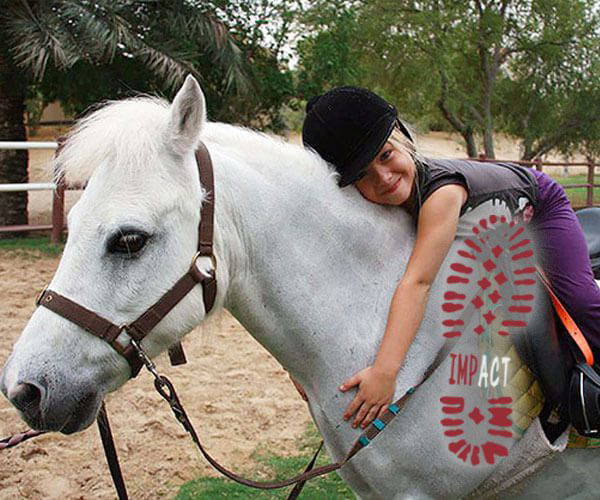Recent research into the effect of horse riding demonstrated that after just 12 weeks 74% demonstrated physical improvement, 77% experienced greater confidence and 75% more enjoyment. 65% showed a greater willingness and ability to communicate, 72% showed improved relationship building skills and 78% demonstrated clear advances in horsemanship.

A study has shown that children receive both immediate and long lasting positive benefits after spending time with and riding horses. This included a reduction in irritability, improved speaking fluency and communication. Horses were also seen to reduce hyperactivity and instil calmness, but this was an effect that only lasted whilst interacting with the horses.
Research done at the University of Colorado Anschutz Medical Campus has shown that there is a lasting reduction in irritability and positive social impacts through interacting with the horses.
“There is growing evidence that human-animal interventions can improve emotional health and social wellness in youth, particularly those with autism spectrum disorder,” said the study’s principal investigator, a professor of psychiatry. “Our study was rigorous and the findings remarkable.”
The Study included 127 children aged 6-16years old, showed that taking part in a 10 week therapeutic programme showed improvements in:
Irritability
Hyperactivity
Social Skills
Word Fluency
Research carried out at a follow up trial, which included 44% of participants from the initial trial. Showed that the benefits from the 10week study were having lasting positive effects. It is important to note that although positive effects were being recorded in language and mood, the effect on hyperactivity was not improved in the long term, and the positive effects were only noted whilst the participant was interacting with the horse.
Evidence has shown that using horses as part of a therapeutic programme would help to maintain improvements in individuals. Horse riding is known to have many physical benefits on people , including improved motor skills and coordination as well muscle tone and core stability (Baik et al 2014)

Many autistic people are seen to benefit from spending time with animals as well as horses. Theories suggest that this is likely to be linked with the strong desire to maintain a familiar routine- of which is often used in the management of horses and other animals. “Horses are known to prefer the same routine, the same stall, the same path or route, and the same habits, similar to children with autism,” wrote L. Eugene Arnold. “More importantly, horses are content to be guided by nonverbal communication but are amenable to verbal instruction, allowing children to experience and practise the power of communication by controlling a much stronger force than themselves in ways within their repertoire.” Suggestions have also been made that horse is particular are of benefit due to the rhythmical way they move creating a calming effect. equine-assisted activities and therapies”—using the horse as a therapeutic tool—”are clearly a viable intervention option for participants with impairments in balance, gross and fine motor function, gait, spasticity, and coordination, communication and language.
Search
Recent Articles
- The Good, The Bad and The Ugly of Coaching
- Does your horse need more energy, especially when competing?
- Grade 1 International Para Dressage Rider Di Green- Why Lexi Needed a Year Off
- Louise Blanch – Driving Towards New Horizons with the Continued Support of the Para Equestrian Foundation.
- Kissing Spine – Prevention or Cure?
Categories
- Advice Hub
- Athlete
- Carriage Driving
- Dentistry
- Dressage
- Endurance
- Eventing
- Farrier
- Featured
- Featured Horse Ads
- Featured Posts
- Horse Racing
- Horse's Mouth
- Horseball
- Hunting
- Le Trec
- Leisure Riders
- Mounted Games
- Nutrition
- Polo
- Polocrosse
- Reining
- Rescue & Rehabilitation
- Show Jumping
- Showing
- Tack Room
- Team Chasing
- The Pony Club
- Therapy
- Training
- Vaulting
- Veterinary




